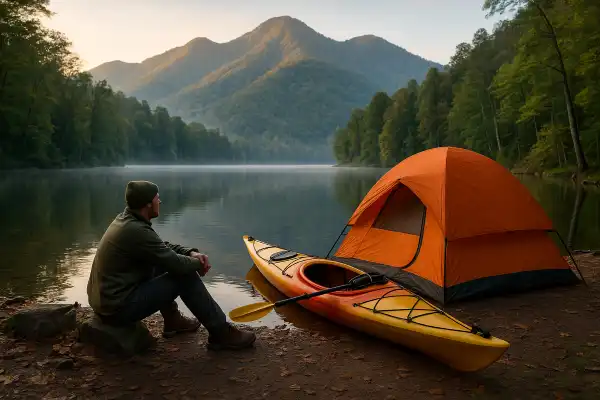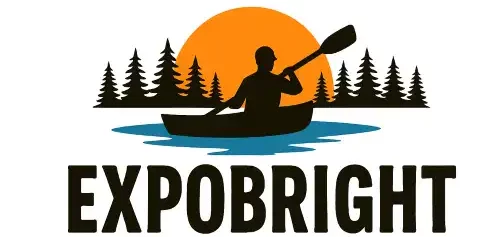Where can you kayak camp in Tennessee remains one of the most frequent questions I receive from paddlers planning their first multi-day river adventure in the Volunteer State. The combination of Tennessee’s diverse waterways and varying access to overnight accommodations creates uncertainty for many outdoor enthusiasts seeking to blend their love of paddling with camping under the stars.
Having guided countless trips through Tennessee’s river systems over the past decade, I’ve discovered that the key to successful kayak camping lies not just in finding a place to pitch your tent, but in understanding which locations offer the perfect balance of scenic beauty, safe access, and legitimate overnight opportunities. The variety of options can be overwhelming without proper guidance.
Where can you kayak camp in Tennessee?
Tennessee offers numerous kayak camping opportunities across state parks, private campgrounds, and designated scenic rivers, with options ranging from primitive riverside sites to full-service facilities with amenities. The Buffalo River stands out as the premier destination, offering over 125 miles of paddling with multiple camping options, while state parks like Hiwassee/Ocoee and various Cumberland River locations provide additional choices for overnight adventures.

Buffalo River: Tennessee’s premier kayak camping destination
The Buffalo River earns its reputation as Tennessee’s most popular kayak camping destination for good reason. This 125-mile waterway is the longest un-impounded river in middle Tennessee, providing paddlers with an authentic wilderness experience. The upper portions between Henryville and Flatwoods are floatable from November through August, while the remainder flows year-round.
Several established outfitters along the Buffalo River provide both rental equipment and camping services. Buffalo River Resort near Lobelville offers primitive camping spots right along the riverbank as well as RV sites with full hookups. The resort provides shuttle services, allowing paddlers to start upstream and float back to their campsite.
On the Buffalo campground provides a more intimate experience with only 5 total campsites on 12 acres featuring forest, pasture, bluff and river front. This privately owned primitive camping area offers approximately 400 feet of river frontage and requires advance reservations.
For Scout groups and larger parties, Grimes Canoe Base near Flatwoods accommodates nearly 300 Scouts, leaders and family members on the river each day with access to over 110 miles of water.
Tennessee State Parks with kayak camping
Several Tennessee State Parks combine excellent paddling with overnight camping facilities. Parks with ramps and canoe/kayak put-ins include Bledsoe Creek, Henry Horton, Hiwassee/Ocoee, Port Royal, Rock Island, and Seven Islands.
Hiwassee/Ocoee Scenic River State Park stands out for whitewater enthusiasts. The Hiwassee River section from the NC state line to Delano features flat water and whitewater class I, II, and III rapids. The state park offers camping facilities and multiple public launch areas.
Tennessee State Parks offer various camping experiences from RV sites for vehicles ranging 20 to 100 feet to primitive tent-only sites. Tennessee residents receive a 10% discount off normal rates at most overnight accommodations.
Cumberland River system
The Cumberland River and its tributaries provide extensive kayak camping opportunities throughout Middle Tennessee. The Cumberland River spans 668 miles and flows through major cities including Nashville and Clarksville, with banks lined with picnic grounds, campgrounds, stores, and parks making it suitable for multi-day trips.
The Caney Fork River, a Cumberland tributary, offers year-round paddling opportunities. Several outfitters near McMinnville provide kayak rentals and camping options along this scenic waterway.
Red River Canoe Rentals near Adams provides both primitive tent camping and RV camping short term and long term options. The moderately shallow river features sandy beaches and rock bottom with several small sandbars perfect for picnic stops.
Duck River adventures
The Duck River is middle Tennessee’s most popular river for canoeing and kayaking at 284 miles long, the longest river located entirely within Tennessee. Multiple outfitters along the Duck River provide camping services, though many areas require coordination with private landowners.
Higher Pursuits near Columbia offers guided trips and rental services on the Duck River, providing access to this Class I river known for its scenic pastoral lands, steep rock cliffs, and forested banks.
East Tennessee mountain rivers
The French Broad River provides a unique camping experience flowing through the Appalachian region. The 33-mile scenic river section provides nine access points along more than forty miles of blueway extending from the NC line to Walters Bridge.
Watauga Lake offers beautiful mountain views with opportunities to paddle to small islands along shorelines, perfect for a combination of lake and camping experience.
Private campgrounds and outfitters
Smooth Rapids Outfitters & Grill in McMinnville exemplifies the full-service approach to kayak camping. They offer kayaking, camping, and restaurant facilities all in one location with family-friendly amenities including a playground and live music stage.
Essential considerations for Tennessee kayak camping
Tennessee kayaking laws require specific safety equipment. All vessels less than 39.4 feet must have means to make an efficient sound signal such as a whistle, and all paddlecraft must exhibit a white light after sunset or during reduced visibility.
Most Tennessee State Park campgrounds are trash-free with centrally located dumpsters and recycling bins. All campgrounds are pet-friendly but require pets to be leashed and under control at all times.
When planning primitive camping along rivers, always verify land ownership and obtain proper permissions. Many beautiful riverside spots are on private property, and trespassing can result in significant legal issues.
Conclusion
In 2015, I guided a family of four on their first Buffalo River camping trip, watching their initial nervousness transform into pure joy as we set up camp along a quiet bend near Lobelville. The father later told me that having a detailed plan—knowing exactly where we could legally camp, what equipment we needed, and which outfitters to trust—made the difference between a stressful adventure and a lifetime memory. Following a comprehensive guide ensures kayak campers can focus on what matters most: experiencing Tennessee’s incredible waterways while creating lasting outdoor memories with confidence and safety.
